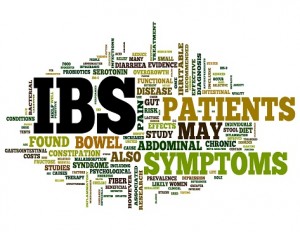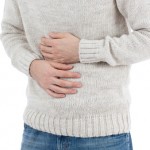Irritable bowel syndrome symptoms, recognizing IBS signs, triggers, and types
 Irritable bowel syndrome (IBS) symptoms can occur at any time, leaving you bloated, cramping, and overall uncomfortable. Furthermore, symptoms are ever-changing and IBS flare-ups can range in severity as well, so if you don’t know what triggers the symptoms, you could be left with the burden they bring.
Irritable bowel syndrome (IBS) symptoms can occur at any time, leaving you bloated, cramping, and overall uncomfortable. Furthermore, symptoms are ever-changing and IBS flare-ups can range in severity as well, so if you don’t know what triggers the symptoms, you could be left with the burden they bring.
The most common IBS symptom is abdominal pain and discomfort, which is often relieved by passing a bowel movement. There are many reasons why abdominal pain and discomfort occur, one of them being changes to bowel movements and another, food triggers.
Some symptoms related to IBS can be chronic and symptoms may even change over the course of the disease. In other cases, symptoms may be contradicting. For example, starting with diarrhea, then alternating with constipation.
To best manage your IBS symptoms, it’s important to not only recognize the symptoms, but understand the types of the condition and the triggers.
Types of irritable bowel syndrome
Irritable bowel syndrome isn’t just one simple condition. In fact, there are three different types of IBS. Understanding the different types can help narrow in on your diagnoses, so you can obtain the proper treatment for your symptoms and specific condition.
Types of IBS are: IBS with constipation, IBS with diarrhea, and IBS with alternating constipation and diarrhea.
In IBS with constipation, stomach pain is followed by bloating, infrequent bowel movements, or lumpy and hard stool. IBS with diarrhea begins with stomach pain and discomfort followed by frequent urges to pass a bowel movement, which is generally runny or soft. Lastly, IBS with alternating constipation and diarrhea consists of both of the other two types.
Treating IBS is difficult as there isn’t one treatment method that works for all types of IBS. After distinguishing which type of IBS you have, your doctor can make a tailored treatment plan to offer you relief from your symptoms.
When dealing with constipation or diarrhea, it is recommended that patients not take over-the-counter medications unless advised by their doctors, as it may worsen your symptoms. By self-treating you raise the risk of escalating IBS symptoms. It can be frustrating going back and forth dealing with the variety of symptoms you could be experiencing.
Irritable bowel syndrome triggers
Triggers for irritable bowel syndrome are vast and can vary from person to person. By becoming aware of possible triggers of IBS you can begin to narrow in on your specific ones.
Common triggers for IBS include foods and drinks that dehydrate you, which can lead to constipation, fatty foods that can trigger diarrhea, stress and anxiety, certain antibiotics, antidepressants, medications that contain sorbitol, menstruation, lack of exercise, and food.
Food is a large trigger for IBS, and although there are lists of common foods that may trigger IBS symptoms, oftentimes you won’t fully know until you ingest a food and experience the symptoms. Furthermore, your trigger foods can be quite different from the trigger foods of other patients so you need to be aware of what you’re consuming.
Common foods that trigger IBS symptoms include chocolate, dairy products, red meat, unripe bananas, caffeinated foods and beverages, and carbonated or alcoholic beverages.
Signs and symptoms of IBS in adults
 Symptoms of IBS are often worsened after consuming a meal, and for others symptoms can be short-lived or even last for days. Sometimes, symptoms may be milder and chronic, while other people may feel completely fine for days.
Symptoms of IBS are often worsened after consuming a meal, and for others symptoms can be short-lived or even last for days. Sometimes, symptoms may be milder and chronic, while other people may feel completely fine for days.
The primary symptoms of IBS include:
- Abdominal stomach pain and cramping
- Change in bowel habits – from diarrhea to constipation
- Bloating and swelling of the stomach
- Gassiness
- Urgency to go to the bathroom
- Feeling of not completely emptying your bowels
- Passing mucus in your stool
Accompanying symptoms may also be experienced, including:
- Low energy
- Feeling sick
- Backache
- Bladder problems
- Pain during sex
- Incontinence
Abdominal pain experienced in IBS can be a direct result of the bowels. For example, pain may be lessened after a bowel movement has been made, pain may increase with the urgency to pass a bowel movement, or pain may be worsened with changes to your bowels.
Other symptoms that may accompany IBS
Additional symptoms that may be experienced in IBS include heartburn, feeling full quickly, nausea, abdominal fullness, bloating, muscle pain, sleep disturbances, and sexual dysfunction.
There are symptoms that are seen in inflammatory bowel disease but not in irritable bowel syndrome, so if you notice these symptoms you should see your doctor in order to undergo testing for potentially another disease. These symptoms include anemia, blood in stool, unexplained weight loss and fever. These are not symptoms of IBS, and if you begin experiencing them, see your doctor right away.
If you’re struggling to manage your IBS symptoms, speak to your doctor as you may have a specific type of the condition for which they can recommend a more specific treatment.
Some IBS patients obtain relief from new drug
A new irritable bowel syndrome (IBS) drug offers relief from diarrhea and stomach pains, but only for some patients. Two clinical trials of the drug revealed that symptoms of IBS were relieved for up to six months. Continue reading…
-
Is Fast Weight Loss Possible?
Many people wonder about the concept of these quick weight loss pills
-
How to Lose Arm Fat for Women - 5 Exercises to Remove those Fats on the Arms
For most women, having flabby arms is wh
-
The Total Wellness Cleanse Diet Program Works For Better Health
Are you in need of a diet like the majority of the people in this c
-
Some Tips To Lose Weight In A Natural Way
Here are some tips to lose weight in a natural way. The first of our t
-
Weightloss Hints
Because of the persistent medias call on the standards of what is attr
-
Speed Up Metabolism the Natural Way
Metabolism; Its a word that everyone who
- DON'T MISS
- Reduce Weight at the Fastest Possible Speed
- Is Taking Herbal Weight Loss Product the Perfect Solution to Losing Weight?
- Dieting Upgrading Your NonConscious Mind Part 2
- How Can Positive Affirmations Help You Loose Weight?
- 6 Ways for Couples to Exercise Together
- Top Ten Weight Loss Tips
- Fat Burning Furnace: Practical Strategy To Reduce Weight Rapidly
- Want Weight Loss Success? Take these six steps first!
- Energy Bars: Natural Boost
- Lose Weight with Proper Nutrition




